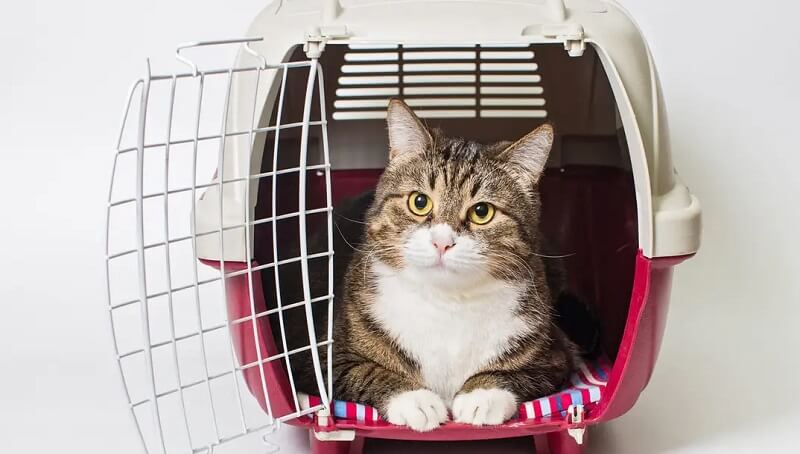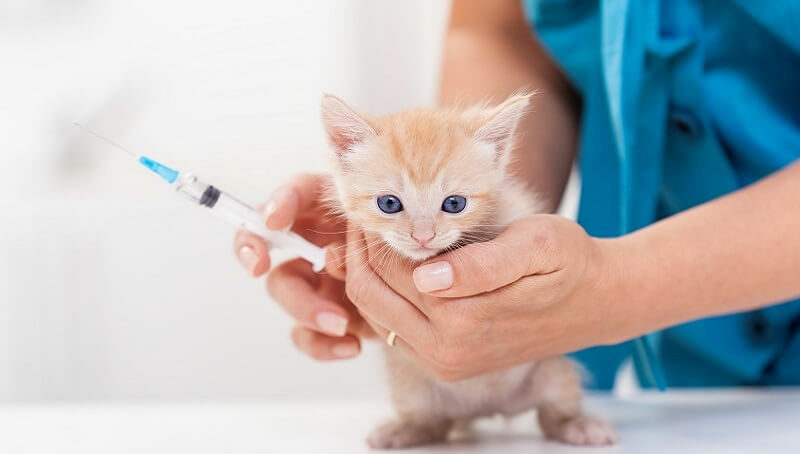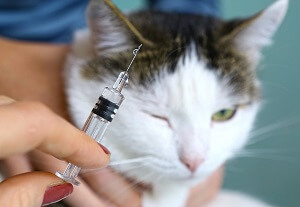
Tips For Choosing a Cat Carrier
October 31, 2022
Interesting Facts About The Aardvark
November 1, 2022
Vaccinating a cat is important for her health, especially if it is an outdoor cat.
In order for your cat to be healthy and enjoy life for a long time, you should vaccinate her. Otherwise, cats can suffer from serious diseases that could have permanent consequences or, in the worst case, can be lethal. Only vets can handle the cat’s vaccination. Only they are allowed to complete the pet’s health record.
Each vaccine injects pathogens into the cat, but they do not cause any disease. With these, the cat forms its so-called antibodies. They prevent the cat from getting various diseases.
What should I consider before vaccinating my cat?
If you want to vaccinate your cat, first make sure the pet is healthy. This includes being properly dewormed and fed. Only then can the vaccine be effective and will not weaken the cat’s immune system. If your cat is sick or weakened, a vaccine will not give your cat any immunity or it will give her a weak one.
When should a cat be vaccinated?
Vaccination of the cat should begin at 8 weeks at the earliest. Basic immunization with the most common vaccines against the feline panleukopenia (FPL) virus and cat flu are recommended. This way, your kitten will be protected against dangerous diseases. In the first few weeks of life, kittens are still protected by antibodies from the mother, present in their blood. During this period, they can only strengthen their own immunity against pathogens to a certain point. So, it is recommended to repeat the vaccine at 12 weeks of age. If cats are already over 12 weeks old at the time of vaccination, a single vaccine is enough to give them safe immunity.
Is it necessary to vaccinate your indoor cat?
Cats that do not have access outside have no contact with unknown cats, so they are less likely to get diseases. But there are also typical feline diseases that can be transmitted even without contact with other cats. This is true for example for feline panleukopenia virus and cat flu. Therefore, a vaccine against these diseases is as useful for apartment cats as it is for those who have access outside.
You might also like our articles about:
- Vaccination schedules for puppies and adult dogs
- How much Benadryl can you give your dog
- Taurine effects on cats
What vaccines are recommended for cats?
As in humans, most vaccines include a basic immunization and subsequent booster. Ask your veterinarian to find out when you need to vaccinate your cat or how often you should do a booster.
There are effective vaccines against the most dangerous diseases that cats could suffer from. These include:
- Feline panleukopenia
- Cat flu – RCP (Herpes, Calicivirus, Panleukopenia)
- Feline leukemia (leukosis)
- Feline infectious peritonitis (FIP)
- Rabies
Unfortunately, currently, there is no authorized vaccine against feline immunodeficiency virus (FIV).
Vaccination of the cat: Recommended vaccination scheme for cats
Feline panleukopenia
In most cases, it is the feline parvovirus panleukopenia that triggers panleukopenia. It is similar to the virus that causes parvoviruses in dogs. It is transmitted from animal to animal, but also through objects on which the pathogen is located. Feline panleukopenia is transmitted very quickly. The virus is characterized by high resistance and can be a permanent danger to unvaccinated cats. It can be found in the poop of sick cats, as well as in cats that have already survived the disease. The vaccine should be given at 8 weeks of age. It depends on the preparation whether the vaccine should be made once a year or once every three years. Your veterinarian can give you information about this. The disease often occurs in young cats. The first signs of the disease generally appear between three and nine days after infection. These include fatigue, loss of appetite, fever, refusal of food, and vomiting.
Cat flu
Cat flu is caused by the calicivirus or herpes virus. The harmless name can mislead you. In fact, the disease is highly infectious and can lead to pneumonia or even loss of the cat’s vision. In the worst case, if not treated, it can be fatal. The cat should be vaccinated at 8 weeks of age. If the cat has access outside, veterinarians recommend an annual vaccination, while an apartment cat can only be vaccinated once every three years
Rabies
Rabies is fatal after infection. The rabies vaccine provides protection not only to the animal but also to its owner. Because rabies is transmitted from cats to humans and can be fatal to humans as well. According to WHO, about 50,000 people die of rabies every year. It is caused by the rabies virus, Lyssavirus. The rabies vaccine is mandatory if you want to take the cat on a trip abroad. Cats that have access to the outdoors are those affected by rabies. Vaccination of the cat against rabies should be done at the age of 12 weeks. This vaccine should be repeated every two or three years, depending on the preparation. A veterinarian can give you more information.
Feline leukemia (leukosis)
Feline leukemia or leukosis is an incurable disease today. It leads to tumors and problems in the formation of blood cells. The disease generally affects outdoor cats. So, if your cat likes to walk outside, vaccinate her at 9 weeks of age. The booster is done annually or once every three years. Contact a veterinarian who will be happy to give you more information.
PIP (feline infectious peritonitis)
Feline infectious peritonitis is caused by a feline coronavirus, the most common form of this being peritonitis. In some cases, however, it only affects the pleura. Rarely does the FIP virus spread from cat to cat. There is a good chance that this coronavirus will not develop into the FIP virus in healthy cats. FIP is a fatal disease.
Rhinitis (Chlamydophila Felis)
Vaccination is done at 8 weeks of age. The disease generally affects the eyes and manifests as unilateral or bilateral conjunctivitis. Chlamydiosis occurs mostly in kittens or in homes where several cats live. If this applies to you, we recommend that you vaccinate your cat against Chlamydophila Felis. There is a risk that the pathogen will be transmitted from infected animals to humans.
Adverse reactions to cat vaccination
 It is normal for some cats to experience side effects after vaccination, such as inflammation of the area or small pain. Problems arise when things are more complicated and the cat experiences more serious symptoms. We can talk about mild, moderate, or very serious allergic reactions that can occur a few hours after vaccination. Each vaccine can have its own side effects, but there are also some common ones.
It is normal for some cats to experience side effects after vaccination, such as inflammation of the area or small pain. Problems arise when things are more complicated and the cat experiences more serious symptoms. We can talk about mild, moderate, or very serious allergic reactions that can occur a few hours after vaccination. Each vaccine can have its own side effects, but there are also some common ones.
The adverse reaction to a vaccine may be a normal defense response that the body transmits. The vaccine contains an antigen that must stimulate the immune system to create antibodies that attack the virus when it enters the body. However, there are situations where a cat’s immunity is very sensitive and reacts too harshly to the antigen in the vaccine. There are a number of vaccines for some diseases that are known to cause some side effects, including the vaccine for giardiasis, chlamydiosis, Bordetella, herpes, or rabies.
Without giving it a second thought, go to your veterinarian to vaccinate your cat. Following the recommendations received from the doctor, try to keep in mind that a sick cat can make people and animals sick. In addition, vaccination saves cats from many unpleasant symptoms, even if they are not most excited when they are stung with the syringe.
In addition to vaccinating your cat, there are other things that matter to keep it healthy. A strong immune system due to high-quality food, filtered water, warm bedding, and of course many petting sessions, provides additional protection.
